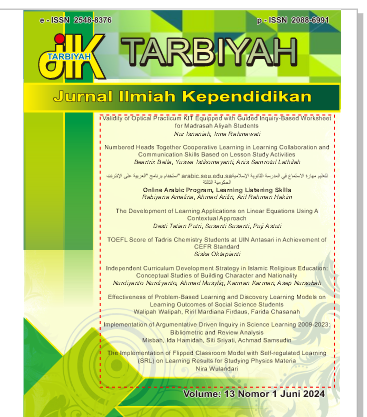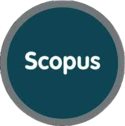Numbered Heads Together Cooperative Learning in Learning Collaboration and Communication Skills Based on Lesson Study Activities
DOI:
https://doi.org/10.18592/tarbiyah.v13i1.10999Keywords:
learning collaboration , communication skills , numbered head togethers , lesson studyAbstract
Education directly continues to experience a process of change from time to time. In 21st-century learning, there are important skills for students, namely collaboration and communication skills. This research aims to discover how students' collaboration and communication skills apply the NHT learning model to excretory system material. This lesson study activity consists of 2 meetings; the implementation stages are plan, do, and see. The planning stage is on May 14, 2023, for the first and second meetings; the do stage is on May 23, 2023, for the first meeting and May 25, for the second meeting. View stage: May 23, First meeting, and May 26, second meeting. The subjects in this research were 17 class VIII students at Sunan Giri Middle School, Malang. The instruments used are observation sheets, reflection notes, and documentation. The results show student collaboration and communication skills change during the first and second meetings. Meanwhile, N-Gain's overall score for collaboration skills is 0.43 in the medium category, and communication skills is 0.40 in the medium category. In this research, collaboration skills are more prominent than communication skills. NHT is quite relevant for increasing student collaboration and also student competition between groups.References
Aimah, S., & Purwanto, B. (2018). Indonesian Teachers’ Perception on the Implementation of Lesson Study: Exploring Teachers’ Awareness of Pedagogical Knowledge. Arab World English Journal, 9(4), 380–391. https://doi.org/10.24093/awej/vol9no4.28
Alimah, S., & Utami, L. (2019). Human Reproduction Contextual Case-Based Worksheet to Improve Students’ Interpersonal Communication and Collaboration Skills. Biosaintifika: Journal of Biology & Biology Education, 11(2), 256–263. https://doi.org/10.15294/biosaintifika.v11i2.19760
Brew, A., & Saunders, C. (2020). Making sense of research-based learning in teacher education. Teaching and Teacher Education, 87, 102935. https://doi.org/10.1016/j.tate.2019.102935
Campbell, R., Okey, J., Quitadamo, I. J., Kurtz, M. J., Paul, R. and Nosich, G., & Rathburn, B. S. (1993). Curriculum & Leadership Journal _ Skills for the 21st Century_ teaching higher-order thinking. CBE - Life Sciences Education, 6, 1–15. https://doi.org/10.1187/cbe.06
Dam, R. F., & Teo, Y. S. (2018). What is Design Thinking and Why Is It So Popular? Interaction Design Foundation, 1–6. https://www.interaction-design.org/literature/article/what-is-design-thinking-and-why-is-it-so-popular
Ekaputra, F., & Widarwati, S. (2023). Discovery Learning Based Practicum Learning in Improving Critical Thinking Skill and Student Creativity. Tarbiyah: Jurnal Ilmiah Kependidikan, 12(1), 47–56. https://creativecommons.org/licenses/by/4.0/
Faraqanita, Novianti, D., & Muchlis. (2020). Penerapan Model Pembelajaran Kooperatif Tipe Numbered Heads Together (Nht) Untuk Melatihkan Keterampilan Komunikasi Siswa Pada Materi Asam Basa Kelas Xi Sma Negeri 11 Surabaya. Unesa Journal of Chemical Education, 9(2), 31–37.
Gilissen, M. G. R., Knippels, M. C. P. J., & van Joolingen, W. R. (2021). Fostering students’ understanding of complex biological systems. CBE Life Sciences Education, 20(3), 1–15. https://doi.org/10.1187/cbe.20-05-0088
Idris, F., Mustafa Din, W., Tajuddin, M., Kebangsaan Malaysia, U., Bangi, U., & Waste Selangor, G. (2020). Adapting Kolb’S Experiential Learning Cycle in Enhancing Attitude and Skills Among Undergraduates Through Volunteerism. Asean Journal of Teaching and Learning in Higher Education (AJTLHE), 12(2), 122–139.
Istikomayanti, Yuswa; Lathifah A.S.; Mitasari Z. (2019). Collegiality as a Key for Improving Students Success in Lesson Study Practices. International Conference on Mathematics and Science Education, 3(1), 184–196. https://doi.org/10.1017/CBO9781107415324.004
Khalid, M., Hj Abdullah, N. A., & Kamoludeen, A. (2016). Teachers’ Belief on the Benefit of Collaboration in Lesson Study. IIUM Journal of Educational Studies, 4(2), 1–20. https://doi.org/10.31436/ijes.v4i2.115
Lathifah, A. S., Istikomayanti, Y., & Mitasari, Z. (2021). Kepercayaan Calon Guru Sebagai Faktor Keberhasilan Pembelajaran Berpusat Pada Siswa. Inteligensi : Jurnal Ilmu Pendidikan, 4(1), 9–18. https://doi.org/10.33366/ilg.v4i1.2477
Mardhiyatirrahmah, L., & Abdussakir, A. (2021). Restructuring of Students’ Thinking in Junior High School Through Defragmentation for Solving Mathematical Problems. Jurnal Ilmiah Kependidikan, 10(2), 95–102. http://jurnal.uin-antasari.ac.id/index.php/jtjik
Muhfahroyin, M., & Oka, A. A. (2017). Improving Post-graduate Students Learning Activities through Lesson Study in Learning Forest-Prototype. Biosaintifika: Journal of Biology & Biology Education, 9(2), 311–316. https://doi.org/10.15294/biosaintifika.v9i2.6208
Mynott, J. P. (2018). Facilitating the Lesson Study Facilitator: a reflection on expertise in Lesson Study. IPDA Conference 2018, Border Crossings, November.
Nuriyani, Y., & Winarso, W. (2021). Improving Students’ Physics Learning Outcomes Through Implementation of Peer Teaching Method. Tarbiyah : Jurnal Ilmiah Kependidikan, 10(1), 25. https://doi.org/10.18592/tarbiyah.v10i1.4165
Nurmatin, S., & Rustaman, N. Y. (2016). Exploring PCK ability of prospective science teachers in reflective learning on heat and transfer. AIP Conference Proceedings, 1708(1), 080007. https://doi.org/10.1063/1.4941193
Prasetiyo, N. A., & Mitasari, Z. (2016). Penerapan Model Pembelajaran NHT melalui Lesson Study untuk Meningkatkan Pemahaman Konsep dan Kemampuan Mengemukakan Pendapat Mahasiswa pada Matakuliah Biologi Umum. Jurnal Bioedukatika, 4(1), 7. https://doi.org/10.26555/bioedukatika.v4i1.4734
Rahmawati, Y., Mardiah, A., Taylor, E., Taylor, P. C., & Ridwan, A. (2023). Chemistry Learning through Culturally Responsive Transformative Teaching (CRTT): Educating Indonesian High School Students for Cultural Sustainability. Sustainability (Switzerland), 15(8). https://doi.org/10.3390/su15086925
Riti, S. B. (2015). Bara Marapu sebagai Kepercayaan Asli Orang Sumba: Perspektif Pelayanan Hak Sipil dan Ancaman Kepunahan ). Harmoni, 14(1), 120–137. file:///D:/Data/S2/Semester 3/Proposal/Materi/agama marapu terancam punah dan perekonomian/httpdocplayer.info30011145-Bara-merapu-sebagai-kepercayaan-asli-orang-sumba-perspektif-pelayanan-hak-sipil-dan-ancaman-kepunahan.html.pdf
Saito, E. (n.d.). Listening As A Basis Of Reforming Schools In Asia : 42, 105–116. https://doi.org/10.1108/S1479-368720230000042015
Saito, E., Harun, I., Kuboki, I., & Tachibana, H. (2006). Indonesian lesson study in practice: Case study of indonesian mathematics and science teacher education project. Journal of In-Service Education, 32(2), 171–184. https://doi.org/10.1080/13674580600650872
Sari, K. A., Prasetyo, Z. K., & Widodo, S. W. (2017). Pengembangan Lembar Kerja Peserta Didik IPA Berbasis Model Project Based Learning Untuk Meningkatkan Keterampilan Kolaborasi dan Komunikasi Peserta Didik Kelas VII. Jurnal Pendidikan Matematika Dan Sains, April, 5–24.
Sormunen, K., Vehmaa, S., Seitamaa-Hakkarainen, P., Lavonen, J., Hakkarainen, K., & Juuti, K. (2023). Learning science through a collaborative invention project in primary school. Disciplinary and Interdisciplinary Science Education Research, 5(1). https://doi.org/10.1186/s43031-023-00074-5
Stehle, S. M., & Peters-Burton, E. E. (2019). Developing student 21st Century skills in selected exemplary inclusive STEM high schools. International Journal of STEM Education, 6(1), 1–15. https://doi.org/10.1186/s40594-019-0192-1
Sunassee, A., Bokhoree, C., & Patrizio, A. (2021). Students’ Empathy for the Environment through Eco-Art Place-Based Education: A Review. Ecologies, 2(2), 214–247. https://doi.org/10.3390/ecologies2020013
Tan, O. S. (2003). Learning Using Problems to Power.
Triana, D., Anggraito, Y. U., & Ridlo, S. (2020). Effectiveness of Environmental Change Learning Tools Based on STEM-PjBL Towards 4C Skills of Students. Jise, 9(2), 181–187. http://journal.unnes.ac.id/sju/index.php/jise
Widjaja, W., Vale, C., Groves, S., & Doig, B. (2015). Teachers’ professional growth through engagement with lesson study. Journal of Mathematics Teacher Education, 20(4), 357–383. https://doi.org/10.1007/s10857-015-9341-8
Zubaidah, S. (2020). Keterampilan Abad Ke-21: Keterampilan yang Diajarkan Melalui Pembelajaran. Online. 2, 1–17.
Downloads
Published
How to Cite
Issue
Section
License
Copyright (c) 2024 Yuswa - Istikomayanti

This work is licensed under a Creative Commons Attribution 4.0 International License.
Authors retain copyright and grant the journal right of first publication with the work simultaneously licensed under a Creative Commons Attribution 4.0 International License that allows others to share the work with an acknowledgment of the work's authorship and initial publication in this journal.




